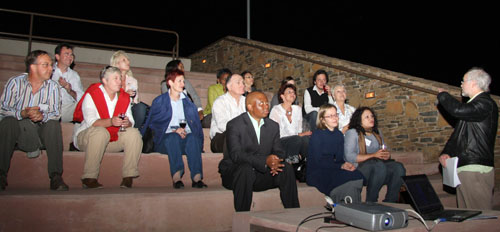Latest News Archive
Please select Category, Year, and then Month to display items
10 March 2022
|
Story Anthony Mthembu
|
Photo Unsplash
 The No Student Hungry team gearing up to start distributing food parcels to the selected students.
The No Student Hungry team gearing up to start distributing food parcels to the selected students.
The UFS is one of the many institutions of higher learning where food insecurity is an active issue. However, the
No Student Hungry Programme is one of the initiatives launched at the university to assist in fighting food insecurity at the institution.
The purpose of the programme
Since its inception in 2011, the initiative has assisted many students in acquiring a healthy meal. Additionally, the Food Environment Office also hands out food packages, so that students can continue to achieve academically. “We are trying to develop a healthy environment for students and make it easier for them to have a nice and healthy meal,” stated Annelize Visagie, who heads the Food Environment Office at the UFS. The Food Environment programme is spread out on all three campuses, each with its own facilitators. Furthermore, the programme mainly caters for students who are not funded by the National Student Financial Aid Scheme (NSFAS) but who are excelling academically. The abovementioned students apply for assistance online, and a list is then drawn up of students who receive assistance for the year.
Alternative solutions to keep the initiative running
On the Bloemfontein Campus, the No Student Hungry Programme will be catering for 200 students in the 2022 academic year, assisting them with a daily nutritious meal. Additional food parcels are also handed out to provide further assistance. “We give food parcels to the students on the list every Tuesday and Thursday at the Thakaneng Bridge,” Visagie highlighted. However, she argues that catering for the student population through this programme can be a challenge, as the demand for assistance is growing rapidly and the ability to assist is limited. The programme relies on partnerships and sponsors to assist the student body. In fact, the coordinators of the programme currently have a memorandum of understanding with Tiger Brands according to which they deliver around 100 food parcels for distribution.
In addition, the coordinators have put in place alternative measures to ensure that they can provide more food to students. “The
Kovsie Act Office, in partnership with the
Department of Sustainable Food Systems and Development, has started a food garden where healthy and nutritious produce are grown, in order to add value to the distribution,” she indicated. Although the programme can only assist to a point, students who are in desperate need of assistance are never turned away. In fact, the
Social Support Unit at Thakaneng Bridge usually assists students with food vouchers for a maximum of four days.
A commitment to teaching healthy eating habits
The programme is not only committed to curbing food insecurity, but also to ensuring that students have a healthy and balanced diet. As such, a booklet is being issued by the
Department of Nutrition and Dietetics in collaboration with the Department of Sustainable Food Systems and Development, which contains ways in which students can make a healthy meal using some of the ingredients offered in the food parcels.
“We want to teach students how to eat healthy in the cheapest way, because they don’t have a lot of money to buy expensive food products,” Visagie argued.
Gauteng business community experiences UFS
2010-09-23
 |
|
Prof. Matie Hoffman from the Department of Physics of the UFS, presenting at the Boyden Observatory to a group of business executives from Gauteng, during their recent visit to the university.
Photo: Gerhard Louw
|
The University of the Free State’s (UFS) Corporate Liaison Office recently hosted a group of eleven business men and women from the private sector in Gauteng on its Main Campus in Bloemfontein. The purpose of the campus visits, which are held two to three times a year, is to give representatives from the corporate sector the opportunity to get to know the UFS first-hand and to help build the brand of the university as a national asset.
During their visit the group of business men and women, amongst others, met with faculty members, they enjoyed a networking session with UFS staff at the Oliewenhuis Art Museum, visited the Unit for Students with Disabilities as well as the Department of Paediatrics and Child Health.
The day ended at the Boyden Observatory where a feedback session was facilitated by Prof. Jonathan Jansen, Rector and Vice-Chancellor, and Prof. Ezekiel Moraka, Vice-Rector: External Relations. After this opportunity where the visitors discussed their experience of the UFS, the day came to an end with a presentation on: The African skies: Stories and science by a Ph.D. candidate from the Department of Physics, Mr Bosco Oruru. One of the highlights of the evening included a sighting of the Hubble Telescope in the sky over Bloemfontein and observing the moon and Venus through one of the Boyden telescopes.
The visitors left with new insights and a great appreciation for the contribution of the UFS to education, research and community service in South Africa.